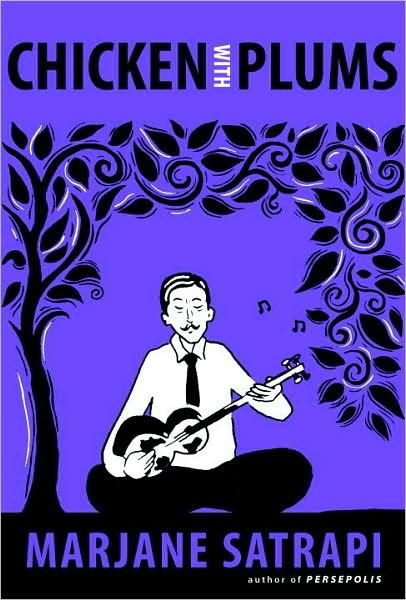
In Chicken with Plums, new in paperback from Pantheon, acclaimed author Marjane Satrapi tells the story of the life and death of her great uncle Nasser Ali, a renowned Iranian tar player who decides to die after his wife destroys his beloved instrument. Satrapi organizes her narrative around Ali’s last eight days alive in November, 1958–from the time he decides to quit eating and not leave his bedroom, to his eventual, somewhat unexplained death. Ali’s life story–and the reasons for his slow suicide–are revealed in a series of dreams, fantasies, flashbacks (and flashbacks within flashbacks!), and even a few flash forwards. Although the context of the recentish 1953 CIA-backed coup informs the plot, Chicken with Plums is far less concerned with Iranian politics than was the book that made her famous, her stunning debut graphic novel, Persepolis. Instead, Chicken plumbs loss and love, art and passion, family and disappointment, and the ways in which the small comforts in life–a favorite meal of say, chicken with plums, or a Sophia Loren flick, ultimately offer no protection against death.
Casual readers to comics often make the error of supposing that the medium is merely words with accompanying pictures. Satrapi’s deft work here might do wonders in correcting this ignorance. There isn’t a wasted panel in Chicken with Plums, and Satrapi commands intense emotion from her thick, black lines. There’s a seamless quality to Chicken with Plums; the text and the pictures, indivisible, add up to more than the sum of their parts. Satrapi knows when to hold back and let her simple black and white images tell the story. There is a certain economy of storytelling that great comic writers can achieve in ways entirely possible in prose, and here Satrapi has surpassed her earlier work in Persepolis, which, while great, often relied heavily on textual exposition. In Chicken with Plums, Satrapi’s evocations of troubled family life, unfulfilled love, the perils of Iranian immigration to California, and Sufi mysticism all blend into a poignant, often-funny, and occasionally devastating portrait that exemplifies the best of the comics medium.
While comparisons to her Persepolis series will undoubtedly hang over all of Satrapi’s work, Chicken with Plums is a wonderful successor, and in some senses, a more achieved work. Although it doesn’t convey the first-person immediacy of Persepolis, nor that memoir’s dramatic scope, the story of Nasser Ali is intimately detailed and achieves something rare in an age of overstuffed books: it leaves its readers hungry for more. Highly recommended.
Salon published a seven page excerpt from Chicken with Plums when the book was originally published in hardback.

[…] Chicken with Plums – Marjane Satrapi. (2009). Retrieved March 21, 2016, from https://biblioklept.org/2009/05/08/chicken-with-plums-marjane-satrapi/ […]
LikeLike
[…] Chicken with Plums by Marjane Satrapi. English translation by Anjali Singh. First Pantheon paperback printing, 2009. Cover image by Satrapi; cover design credited to Brian Barth. I reviewed Plums some years back. […]
LikeLike
[…] Unlike Persepolis, Chicken with Plums focuses on life before the intrusion of Iranian politics, dealing with themes such as nostalgia, loss, family, art, passion, and how small pleasures — such as the […]
LikeLike